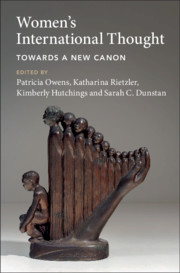Book contents
- Women’s International Thought: Towards a New Canon
- Women’s International Thought: Towards a New Canon
- Copyright page
- Contents
- Preface and Acknowledgments
- Introduction
- 1 Field and Discipline
- 2 Geopolitics and War
- 3 Imperialism
- From “Impressions of the Second Pan-African Congress” (1921)
- From “The London West India Interest in the Eighteenth Century” (1921)
- From Slavery and the French and Haitian Revolutions (1925)
- From Economic Development in the Nineteenth Century (1932)
- From Native Administration in Nigeria (1937)
- From The Berlin West African Conference, 1884–1885 (1942)
- From “Chinese Milk Africans in the Caribbean” (1946)
- From Britain and the United States in the Caribbean (1954)
- Jessie Fauset
- Lillian M. Penson
- Anna Julia Cooper
- Lilian Knowles
- Margery Perham
- Sibyl Crowe
- Amy Jacques Garvey
- Mary Macdonald Proudfoot
- 4 Anticolonialism
- 5 International Law and International Organization
- 6 Diplomacy and Foreign Policy
- 7 World Peace
- 8 World Economy
- 9 Men, Women, and Gender
- 10 Public Opinion and Education
- 11 Population, Nation, Immigration
- 12 Technology, Progress, and Environment
- 13 Religion and Ethics
- Index
Mary Macdonald Proudfoot
from 3 - Imperialism
Published online by Cambridge University Press: 12 April 2022
- Women’s International Thought: Towards a New Canon
- Women’s International Thought: Towards a New Canon
- Copyright page
- Contents
- Preface and Acknowledgments
- Introduction
- 1 Field and Discipline
- 2 Geopolitics and War
- 3 Imperialism
- From “Impressions of the Second Pan-African Congress” (1921)
- From “The London West India Interest in the Eighteenth Century” (1921)
- From Slavery and the French and Haitian Revolutions (1925)
- From Economic Development in the Nineteenth Century (1932)
- From Native Administration in Nigeria (1937)
- From The Berlin West African Conference, 1884–1885 (1942)
- From “Chinese Milk Africans in the Caribbean” (1946)
- From Britain and the United States in the Caribbean (1954)
- Jessie Fauset
- Lillian M. Penson
- Anna Julia Cooper
- Lilian Knowles
- Margery Perham
- Sibyl Crowe
- Amy Jacques Garvey
- Mary Macdonald Proudfoot
- 4 Anticolonialism
- 5 International Law and International Organization
- 6 Diplomacy and Foreign Policy
- 7 World Peace
- 8 World Economy
- 9 Men, Women, and Gender
- 10 Public Opinion and Education
- 11 Population, Nation, Immigration
- 12 Technology, Progress, and Environment
- 13 Religion and Ethics
- Index
Summary
The relationship between the developed and the relatively undeveloped areas of the world is now generally recognized as one of the major problems of our time. In the past the strong spilled out over their weaker neighbours, often invigorating those able to survive the ordeal. By these means the backward countries sometimes became, in their turn, the leaders in the march of civilization. Public opinion in the democracies of the west has long ceased to commend these ancient and ruthless processes. The alternative policy of the nineteenth century was the doctrine of laissez faire, every state, as every individual, being left to work out its own salvation. The political complement of laissez faire was the policy of non-annexation, individuals and societies being left to develop in a condition of free competition. But already, before the end of the century, the more thoughtful were beginning to discover that laissez faire provided no real solution because the undeveloped countries could not advance except by contact with those more fully developed. In the nineties the positive conception of trusteeship, first enunciated by Burke, was being advanced by ministers – notably Lord Salisbury and Joseph Chamberlain – and by administrators led by Lord Lugard, in the direction of developing backward areas in the interests at once of their own inhabitants and of the world in general. But just as, formerly, the old annexationist process fell into disrepute, so the philosophy of trusteeship, implying as it did a paternal relationship between advanced and backward peoples, has now been discarded as undemocratic. All states must be treated as equal in status, however unequal in fact. A new method has therefore to be evolved whereby undeveloped areas may be developed without conquest, and without the establishment or continuance of any form of paternal overlordship.
- Type
- Chapter
- Information
- Women's International Thought: Towards a New Canon , pp. 181 - 186Publisher: Cambridge University PressPrint publication year: 2022



